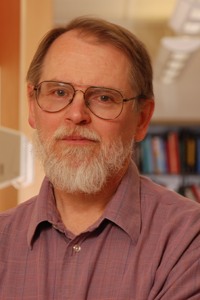 |
Keith Johnson, Ph.D. |
NOTE: This profile is part of a series highlighting the 26 researchers who were named UNMC Distinguished Scientists or New Investigators for 2007. Each of these researchers will be profiled in UNMC Today leading up to a March 20 ceremony to recognize their achievements.
- Name: Keith Johnson, Ph.D.
- Title: Professor
- Joined UNMC: 2001
- Hometown: Omaha but originally Trimont, Minn.
Briefly describe your research in laymen terms, please.
My laboratory studies the cell biology of cell adhesion. We are particularly interested in the role cell adhesion plays in cancer progression.
What led you to pursue this area of research?
It was my interest in cell biology. I think cell biology is the most exciting thing since sliced bread. Since cell adhesion can be studied in so many ways and impacts so many aspects of cell behavior, it is a good area for my research.
How do you see your research contributing to science?
I hope our research helps in developing a better understanding of metastasis and ways to control and treat it.
Why did you become a scientist?
In large part, I became a scientist simply because I was and still am interested in science. Since I have no artistic talent, I stuck to math and science. But I also am a scientist because I tried several other careers before going to graduate school, and I was either not very interested in them or not very good at them — so this is my default path.
What is your hope for the next generation of scientists?
It is my hope they will have the resources, especially the financial resources, to take advantage of all the powerful technologies that have been developed to study problems in cell biology and medicine.
Beyond grant funding, how do you measure success?
Some additional measures of success are when your peers cite your work, when your colleagues solicit your input into their research and when your students and post-docs go on to careers in science.
What would you tell a student interested in a research career?
To choose a research area that makes you want to commit significant amounts of time reading and thinking and talking about it. A recent cartoon showed someone who had just received a call on the phone, and the person says, “Thank goodness you called. I was this close to being alone with my thoughts.” If you want to have an academic career, you should enjoy the quiet time, the time to be alone with your thoughts. So turn off your cell phone.
Do you have a hero/role model? If so, what do you admire most about them?
Margaret Wheelock, Ph.D., and I have been working together in science for a long time and I have the highest admiration for her approach to science and also her stamina. I also have high regard for the many investigators, those toiling in the trenches as well as the high profile ones, whose collective efforts are prodding humans to rely less and less on superstition.
Tell us about your family and hobbies outside of the lab.
My wife Dr. Margaret Wheelock also is a faculty member at UNMC. She and I have worked in the field of cell adhesion for about 25 years. When the weather is warmer than it has been, we like to ride bicycles. We’ve done RAGBRAI a few times and have done a 500-mile bike trip in Europe. We also like to get into our fuel-efficient vehicle and hit the road. I used to get coerced into running, but I dislike it so much that I’ve had a hard time making myself do it.
List three things few people know about you.
- I served in the Peace Corps. For two years, I was a teacher in St. Peters Secondary School in Nkwatia-Kwahu, Ghana (if you are not sure where Ghana is, please look it up on a map).
- I grew up on our family farm, a century farm; and when I was young, we had neither electricity nor running water.
- I think the money game is not a fair game and that all able American families, even the heirs of the wealthy, should work for a living. So with allowance for a few reasonable exclusions, I strongly favor what some want us to think of as the death tax.